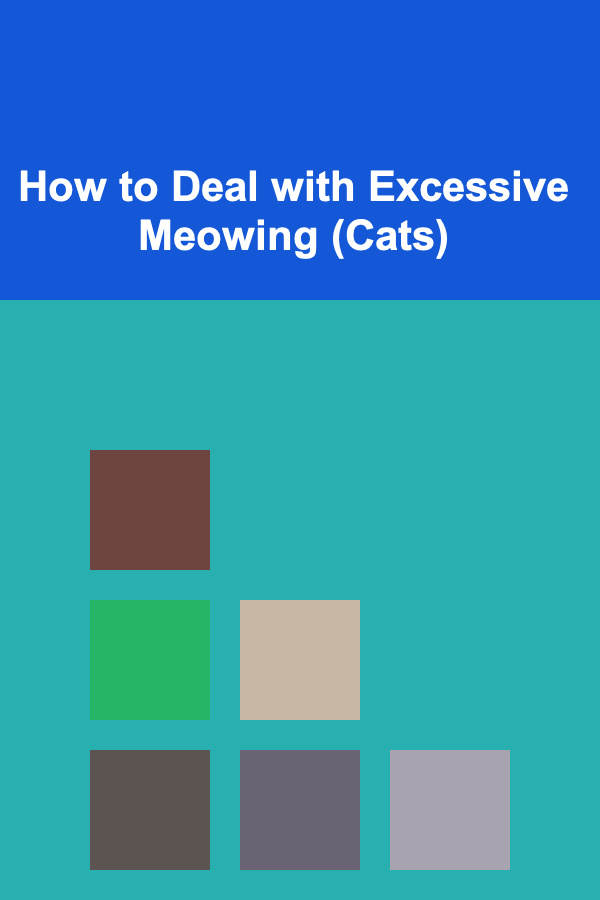
How to Deal with Excessive Meowing (Cats)
ebook include PDF & Audio bundle (Micro Guide)
$12.99$6.99
Limited Time Offer! Order within the next:

Cats, with their cute little meows, can quickly become one of the most endearing companions. However, while a gentle meow or two can bring joy, excessive meowing can be a perplexing challenge for cat owners. This behavior can be a source of frustration and confusion, but it's essential to understand that excessive meowing is not necessarily a sign of misbehavior. Often, it's a form of communication, and addressing the root causes of this behavior requires patience, empathy, and sometimes a bit of detective work.
In this article, we'll explore the reasons behind excessive meowing, the potential health issues associated with it, and practical ways to address this behavior effectively. By the end of this guide, you'll have a comprehensive understanding of why your cat is meowing excessively and how to manage it in a way that ensures both your cat's well-being and your own peace of mind.
Understanding Meowing in Cats
Why Do Cats Meow?
Meowing is a behavior that is unique to domestic cats, unlike their wild relatives who primarily communicate through body language and other vocalizations. Cats generally use meowing as a way to communicate with humans, rather than with other cats. While each meow may vary in tone, intensity, and frequency, the underlying message is usually one of either attention, discomfort, or an unmet need.
In the wild, cats communicate using a variety of sounds, including growls, yowls, and purrs, but meowing is predominantly a human-directed behavior. As cats domesticate themselves and bond with their human companions, they begin to use meows to solicit food, affection, or to express distress.
Types of Meowing
Not all meows are created equal, and understanding the different types of meows your cat uses can give you valuable insight into the underlying causes of excessive meowing.
- Greeting Meows: These are typically short and cheerful meows that occur when your cat greets you after you come home or enter a room. These are normal and expected.
- Attention-Seeking Meows: A cat might meow to get your attention. This could be for petting, playing, or simply sitting together. These meows are often persistent and repetitive.
- Hunger Meows: Cats meow when they're hungry, signaling their need for food. These meows may be more urgent and can increase in frequency as mealtime approaches.
- Discomfort or Pain Meows: If your cat is in pain or feeling unwell, their meows may be louder or more plaintive. This is often a sign that your cat requires medical attention.
- Stress Meows: Cats that are stressed or anxious may meow excessively. This could be a response to changes in their environment, unfamiliar people, or other pets.
- Loneliness Meows: If your cat is left alone for extended periods or doesn't have enough stimulation, they might meow due to boredom or loneliness.
How Meowing Becomes Excessive
Excessive meowing is typically characterized by frequent, persistent vocalizations that may last for extended periods. While occasional meowing is a normal part of cat behavior, excessive meowing can disrupt your daily life and indicate that something is wrong. Excessive meowing may occur at night, during the day, or whenever a cat feels like their needs are not being met.
There are various reasons why a cat may begin to meow excessively, and understanding the root cause is crucial in finding a solution.
Common Causes of Excessive Meowing
1. Hunger or Thirst
One of the most common reasons for excessive meowing is hunger. Cats are often creatures of habit, and if they associate a particular time of day with feeding, they may start meowing loudly to remind you of their impending meal. Similarly, if their water bowl is empty or they are not getting the attention they need when it comes to food, they might increase their vocalizations.
How to Deal With It:
- Make sure your cat's feeding schedule is regular and meets their dietary needs.
- Ensure they have access to fresh water at all times.
- Consider using puzzle feeders to slow down their eating process and provide mental stimulation.
2. Medical Issues
Excessive meowing can sometimes indicate an underlying medical issue, especially if it's a sudden change in behavior. Cats may vocalize more if they are in pain, uncomfortable, or feeling ill. Conditions such as urinary tract infections, dental issues, arthritis, and hyperthyroidism can cause pain or discomfort, leading to increased vocalizations.
How to Deal With It:
- If your cat's meowing is accompanied by other signs of illness, such as lethargy, changes in appetite, or difficulty moving, it's important to take them to a veterinarian as soon as possible for an examination.
- Regular veterinary check-ups can help catch medical issues early before they become a problem.
3. Attention-Seeking Behavior
Some cats meow excessively because they crave attention. If your cat has learned that meowing results in being petted, played with, or given attention, they may use this behavior as a way to get what they want. This type of meowing can be persistent, and the cat may keep meowing until they get the attention they desire.
How to Deal With It:
- Set clear boundaries by ignoring the meowing and only offering attention when the cat is quiet.
- Provide other forms of entertainment and stimulation for your cat, such as toys, cat trees, and scratching posts.
- Try positive reinforcement: reward your cat with affection or treats when they are calm and quiet.
4. Boredom or Lack of Stimulation
Cats are natural hunters, and they need physical and mental stimulation to remain happy and healthy. If a cat is left alone without enough activity, they may resort to excessive meowing out of boredom or frustration.
How to Deal With It:
- Provide your cat with stimulating toys that encourage problem-solving and physical activity.
- Set aside time each day for interactive play sessions with your cat using toys such as feather wands or laser pointers.
- Consider adopting another cat if your cat seems lonely and could benefit from a companion.
5. Anxiety or Stress
Cats are creatures of habit, and any disruption in their environment can lead to stress or anxiety. This could be caused by a move to a new home, the introduction of a new pet, changes in the household, or loud noises like fireworks. Stress can manifest as excessive meowing, especially if the cat feels insecure.
How to Deal With It:
- Try to minimize changes in your cat's environment and provide them with a consistent routine.
- Use calming products like pheromone diffusers (e.g., Feliway) to help reduce stress and anxiety.
- Provide a safe, quiet space where your cat can retreat if they feel overwhelmed.
6. Age-Related Behavior
Senior cats may meow more frequently due to age-related changes. Cognitive dysfunction syndrome (CDS) or feline dementia can cause confusion and disorientation in older cats, leading to increased vocalizations. This behavior might be particularly noticeable at night.
How to Deal With It:
- Establish a predictable daily routine to reduce confusion for your senior cat.
- Consider consulting with your veterinarian about potential treatments or supplements to help manage age-related issues.
- Provide plenty of comfort and security for your elderly cat.
7. Breeding Behavior
Unspayed female cats in heat will often vocalize excessively. This is a natural part of their reproductive cycle as they attempt to attract male cats. The meowing in this case is often loud, persistent, and can be accompanied by other behaviors such as rolling on the floor or increased affection.
How to Deal With It:
- Spay or neuter your cat to prevent this behavior. This is not only important for controlling the pet population, but it can also help reduce stress and behavior problems related to the heat cycle.
Practical Steps for Managing Excessive Meowing
1. Stick to a Routine
Cats thrive on routine, and knowing when to expect food, playtime, or attention can help reduce unnecessary meowing. Try to feed, play, and interact with your cat at consistent times each day.
2. Ignore the Meowing
If your cat is meowing for attention, one of the best ways to deal with it is by ignoring the behavior. If they learn that meowing does not result in attention, they may stop doing it as often. However, this requires patience and consistency, as your cat may initially increase the meowing before learning that it's not effective.
3. Reward Quiet Behavior
Instead of rewarding your cat for excessive meowing, reward them when they are quiet. This helps reinforce the behavior you want to encourage and diminishes the behavior you want to discourage.
4. Provide Enrichment
Offering toys, cat trees, and interactive play can help keep your cat mentally and physically stimulated, preventing boredom and stress that may contribute to excessive meowing.
5. Ensure Health and Comfort
Make sure your cat's basic needs are met, including access to food, water, a clean litter box, and a comfortable resting area. Regular veterinary check-ups are also essential to catch potential health issues before they lead to behavioral changes.
Conclusion
Excessive meowing can be a challenging behavior to manage, but by understanding the underlying causes, you can take appropriate steps to address it. Whether it's hunger, attention-seeking, boredom, anxiety, or a health issue, there are many ways to respond to your cat's vocalizations in a manner that supports their well-being and promotes a peaceful home environment. With patience, consistency, and a little detective work, you can find the best solution to reduce excessive meowing and foster a healthy, happy relationship with your feline companion.
Reading More From Our Other Websites
- [Home Cleaning 101] How to Clean Kitchen Drains Naturally: A Step-by-Step Guide to Unclogging and Freshening
- [Home Renovating 101] How to Use Lighting to Transform Your Home Renovation
- [Home Pet Care 101] How to Bathe a Dog: A Step-by-Step Guide for Pet Owners
- [Biking 101] How to Maintain Your Bike Tires for a Smooth and Safe Ride
- [Personal Financial Planning 101] How to Achieve Financial Freedom: Practical Strategies for Early Retirement
- [Home Lighting 101] How to Create the Perfect Lighting for Your Home's Exterior
- [Home Pet Care 101] How to Establish a Pet Bath Routine: Tips for a Clean and Comfortable Experience
- [Home Family Activity 101] How to Make a Family Time Capsule for Future Generations
- [Home Pet Care 101] How to Set Up a Cozy and Comfortable Pet Sleeping Area
- [Digital Decluttering Tip 101] From Chaos to Control: Building a Secure Password System in Simple Steps

How to Use Minimalist Decor for Your Home Party
Read More
Innovative Approaches in Corporate Training: Enhancing Skills through Interactive Methods
Read More
The Art of Software Development: Innovating Solutions for Tomorrow's Challenges
Read More
Why You Need a Cleaning Schedule for Home Management
Read More
How To Discover Series with Strong World-Building
Read More
Glass Blowing for Jewelry: A Beginner's Project
Read MoreOther Products

How to Use Minimalist Decor for Your Home Party
Read More
Innovative Approaches in Corporate Training: Enhancing Skills through Interactive Methods
Read More
The Art of Software Development: Innovating Solutions for Tomorrow's Challenges
Read More
Why You Need a Cleaning Schedule for Home Management
Read More
How To Discover Series with Strong World-Building
Read More